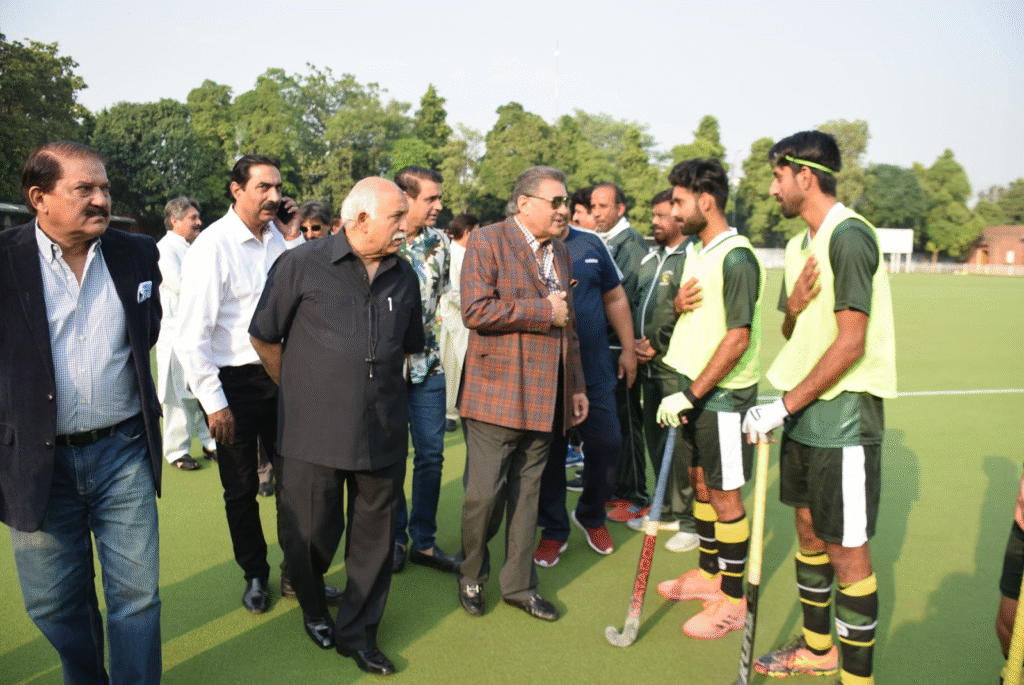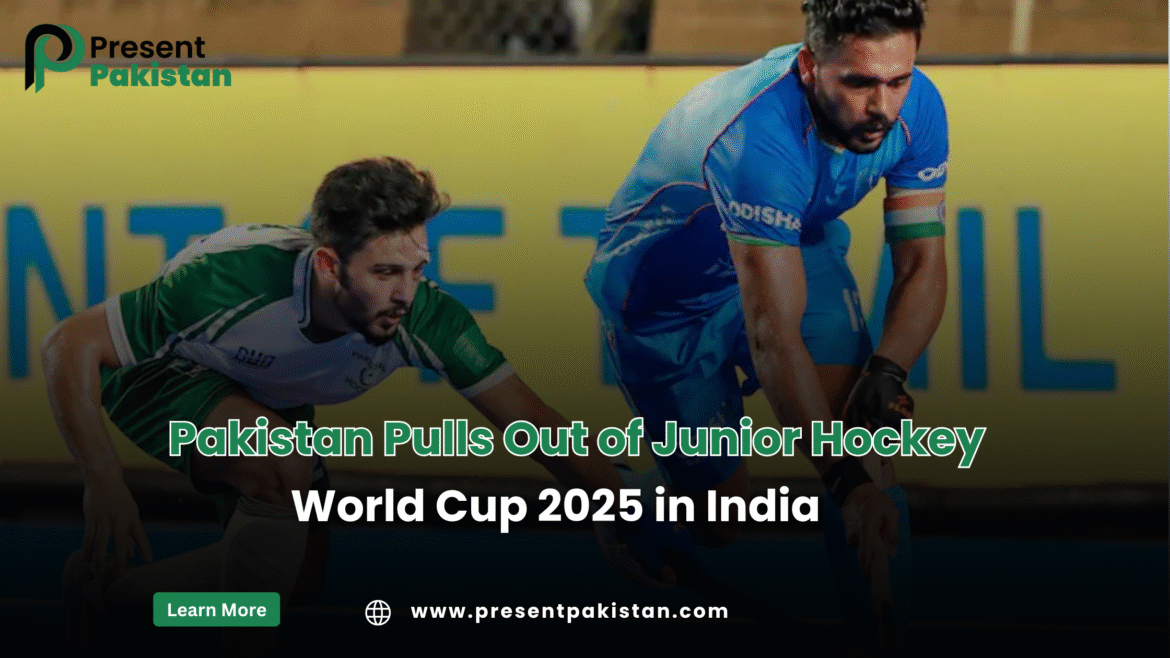Pakistan’s Hockey Exit Shakes the Sporting World
The announcement of Pakistan’s withdrawal from the Junior Hockey World Cup 2025 to be held in India has sent shockwaves through the world of sports and diplomacy. Hockey has been seen for many as an instrument of national identity for Pakistan, so a withdrawal from the World Cup by the Pakistan Hockey Federation (PHF) will be disappointing to many fans and creates uncertainty with regard to how politics, sport, and diplomacy are intertwined.
Many claim sport is a commonality that can bring nations together, but this withdrawal from the Junior Hockey World Cup reinforces that sporting events may be susceptible to political/political security constraints.
Key Points:
- Pakistan is withdrawing from the Junior Hockey World Cup in India, officially.
- Politics, diplomacy, and sport are all intertwined in the decision, and another twist is that no flights from Pakistan to India.
Table of Contents
- Pakistan Pulls Out of Junior Hockey World Cup 2025 in India
- The Historical Pakistan–India Hockey Rivalry
- Reasons Behind Pakistan’s Withdrawal
- Reactions from Fans and Experts
- Political Dimensions of the Decision
- Impact on Junior Hockey Players
- International Media Coverage and Global Response
- Broader Implications for Asian Hockey
- Pakistan Pulls Out of Junior Hockey World Cup 2025 in India
- The Future of Pakistan Hockey
- FAQs
- People Also Ask
- Conclusion
- Should Politics Control Sports?
Pakistan Pulls Out of Junior Hockey World Cup 2025 in India
The announcement from the PHF was a surprise to the fans and the pundits alike. The hockey history of Pakistan, as a four-time Hockey World Cup winner, is long and storied. The federation said clearly that due to “political, logistical, and security issues,” they cannot send their junior team to India for this tournament.
Pakistan has a long history of being a powerhouse in junior and senior hockey, and its absence will be felt by not only the fans but also the tournament as well.
Key Points:
- Pakistan’s withdrawal is symbolic and practical, walking away from the Cup.
- The decision lessens the competition format of the Junior Hockey World Cup.
The Historical Pakistan–India Hockey Rivalry
Whether you are Indian or Pakistani, the rivalry between the two countries runs deeper than your countries’ borders and is embedded in the hearts of sports fans. Since 1947, the rivalry on the hockey field has been the fiercest between the two countries.
Pakistan has won the World Cup four times, and India has had equal success with Olympic and World Cup wins. A match between the two teams is much more than a match; the matches carry political and cultural undertones that span across the world.
By pulling out of this year’s Junior Hockey World Cup, Pakistan has prevented its fans from experiencing another chapter in the rivalry.
Key Points:
- Pakistan-India hockey matches are iconic and watched across the globe.
- This withdrawal terminates a historical sporting legacy.
Reasons Behind Pakistan’s Withdrawal
The Pakistan Hockey Federation (PHF) identified three sources of concern:
- Visa issues: Pakistani player(s) had trouble getting their travel documents.
- Security issues: PHF was worried about players and staff in this environment.
- Political context: Again, the relationship between Pakistan and India made it diplomatically inappropriate to participate.
In the end, it created a situation where Pakistan had few choices and an outcome where junior players lost a chance to compete on a world stage.
Key Points:
- The visa issues, security issues, and political context were the main three issues.
- The case exemplifies in South Asia that politics has a weight that can hang over sport.

Reactions from Fans and Experts
There has been a clearly divided response to this decision. Many in the hockey community were clearly disappointed. Many supporters maintained that sport is above politics. Others saw a duty to defend the action, claiming safety and dignity should never be held to passion.
Across social media, both #PakistanHockey and #JuniorWorldCup2025 started trending on platforms such as X (Twitter) and Instagram, with everything from outrage to support. Analysts claim to view the decision as part of a larger story in which sport is being increasingly politicized in South Asia.
Key Points:
- Social media reaction is mixed.
- Analysts note the political element to consider in their interpretation.
Political Dimensions of the Decision
The political context cannot be overlooked. Sports diplomacy has been utilized as a mechanism for normalizing relations between Pakistan and India, with everyone aware that India-Pakistan relations are under considerable tension. In this context, when Pakistan withdrew, the message was clear: sports cannot happen if there is a basis of mistrust and hostility.
This withdrawal was about the current political situation, but it also reflects a long-standing issue of separating politics from sports in the context of relations between the two countries.
Key Points:
- Politics had a dominant role in the withdrawal.
- The withdrawal was a symbolic diplomatic message.

Impact on Junior Hockey Players
The ultimate injustice of this decision lies with the junior players. For a lot of players, the Junior Hockey World Cup is a potentially once-in-a-lifetime opportunity to be visible on a global stage. Scouts, sponsors, and clubs are always looking for players that they can sign based on performance in competitions like this.
By not competing in the World Cup tournament, the Pakistani players will miss out on essential exposure and some very valuable experiences for their careers. This may or may not have severe long-term implications for the evolution of hockey in this country.
Key Points:
- Junior players miss global exposure opportunities.
- Pakistan likely misses player development opportunities and falls behind.
International Media Coverage and Global Response
International media quickly covered the event, portraying Pakistan’s decision as a blow to Asian hockey. The media noted the increasing connection of politics to sports to deepen confusion. Some reports even said it was a “loss for hockey fans globally.”
For international observers or fans of the sport as well, the incident demonstrates how fragile sports diplomacy is in South Asia, where age-old political issues guide sporting relations.
Key Points:
- International media termed it a negative development.
- Sports diplomacy has taken a new hit.

Broader Implications for Asian Hockey
Asian hockey has been unable to get a foothold in the global football landscape against primarily Europe and Australia. With the withdrawal of Pakistan, Asian hockey loses another power, and so the competition against the other continents.
Politics has to be remove from sport, or sponsors, supporters, and players will soon not believe that Asian hockey can take on the best in the world.
Key Points:
- It is another blow to the credibility of Asian hockey.
- The long-term issues for the sport are huge.
Pakistan Pulls Out of Junior Hockey World Cup 2025 in India
Pakistan’s withdrawal from the Junior Hockey World Cup 2025 in India could serve as both a sporting disappointment and a political statement. It is more than a simple withdrawal; it is an object lesson on sport and politics in South Asia.
This represents for Pakistan the difficulty of negotiating diplomacy with player safety and national pride in an increasingly polarized world.
Key Points:
- Pakistan Withdraws from Junior Hockey World Cup 2025 in India captures the intersection of sport and politics.
- The decision is both a symbolic and substantive one.
The Future of Pakistan Hockey
Moving forward, the focus for Pakistan hockey is domestic development. We must have training camps, local leagues, and neutral amenities in play to keep players training and competitive.
The Pakistan Hockey Federation (PHF) must focus on grassroots development and promoting international collaboration and development, or face decline behind cricket and other emerging sports in Pakistan.
Key Points:
- Pakistan needs to build and strengthen the domestic hockey system.
- Other opportunities for young people’s development are also very important.

FAQs
Q1: Why has Pakistan pulled out of the Junior Hockey World Cup 2025?
Ans: Due to visa, security, and increasingly hazardous political relationships with India.
Q2: Who is most harmed by this situation?
Ans: The junior athletes miss out on international experience for personal development and career opportunities.
Q3: Will Pakistan be able to play in other tournaments in India?
Ans: Only if diplomatic and security circumstances were more favorable for Pakistan to play.
Q4: What would be the consequences of this incident for Asian hockey?
Ans: It hurts the credibility of Asia and therefore makes it a less formidable competitor internationally.
Q5: What was the reaction from fans to this news?
Ans: A mixed reaction. Some fans were disappointed, while others thought it was the ideal and safest option.
People Also Ask
What does the absence of Pakistan mean for sports diplomacy?
It signals a decline of sports diplomacy; the emphasis becomes politics over sport in South Asia.
Is there an upside for India not to play Pakistan?
Yes, India gets to lose a historic rival, and the tournament loses its lasting reputation.
What does this mean for Pakistan hockey?
It means fully committing to development, hosting neutral tournaments, and partnering with a non-political sports body.
Do you think there will be less interest in hockey in Pakistan as a result of this decision?
Yes, but while the lack of a high-profile international event may temper fan engagement for now, the domestic effort can ignite the spark again.
Conclusion
Pakistan’s withdrawal from the Junior Hockey World Cup 2025 in India is more than a sporting decision; it is a reflection of political realities, strained diplomatic ties, and the difficulty of separating sportsmanship from national interest.
For the players, it is a lost opportunity. And yet, for Pakistan hockey, this could be a turning point, for Pakistan hockey reminds us that more than anything else, the future of Pakistan hockey rests on investment, preparation, and perseverance.
Pakistan hockey’s way forward lies not in withdrawal but in building trust, developing talent, and working so that politics never completely robs sports of its unifying characteristic.
Should Politics Control Sports?
Pakistan’s recent announcement to withdraw from the Junior Hockey World Cup 2025 in India brings to the forefront a broader question of the intersection of politics and sports.
Do you think politics should dictate sports decisions? Share your feedback, position, and any support for Pakistan hockey at PresentPakistan.com today.







